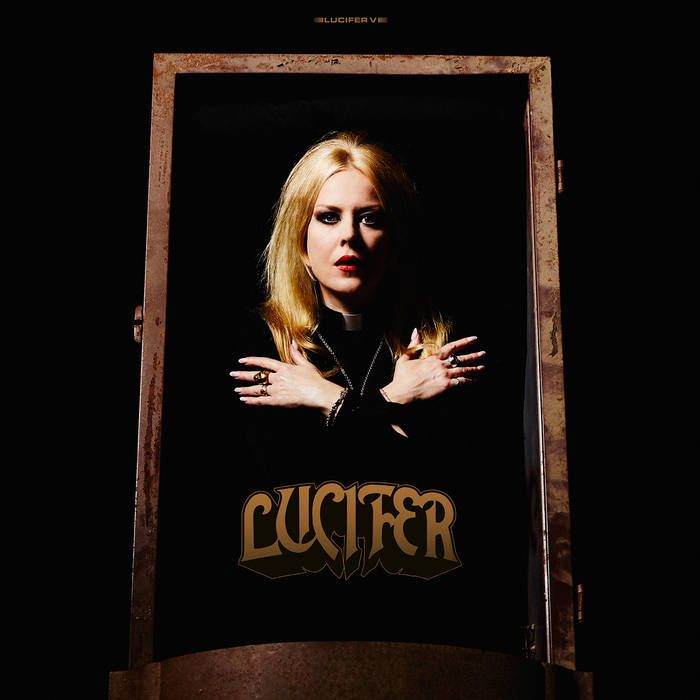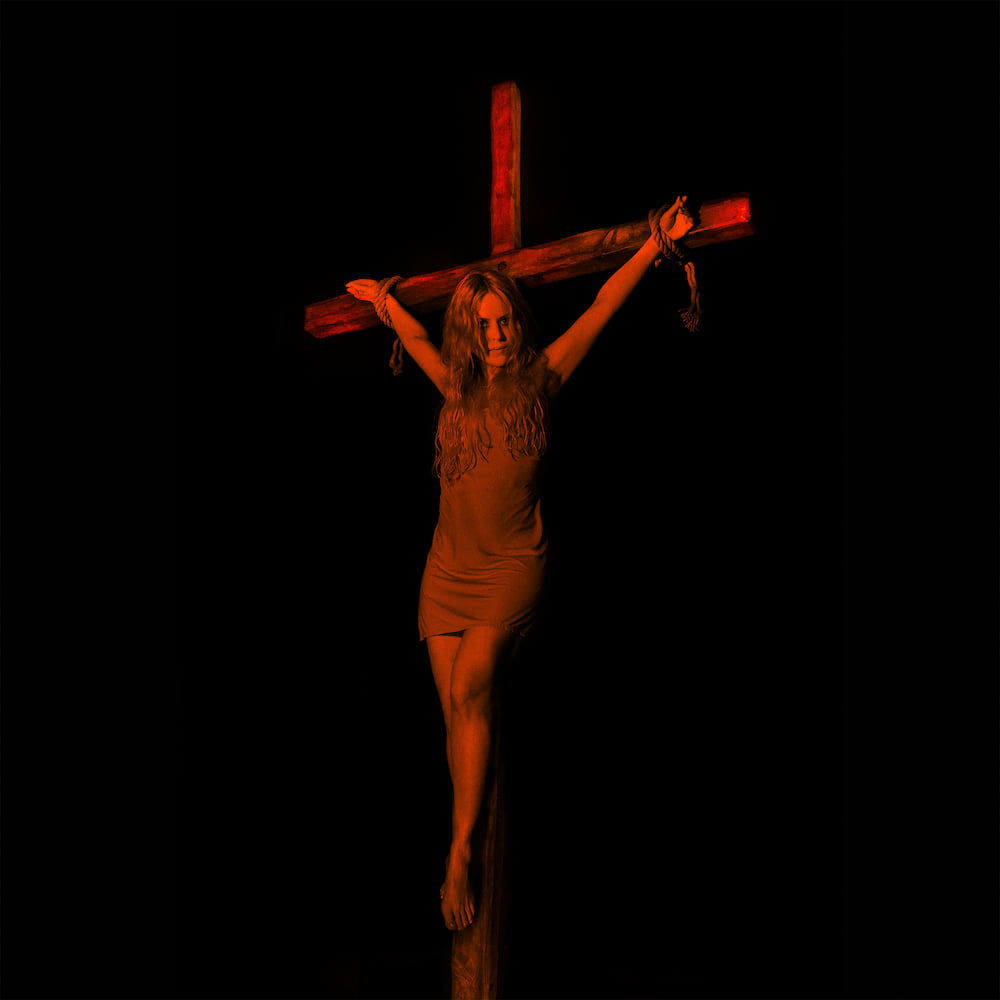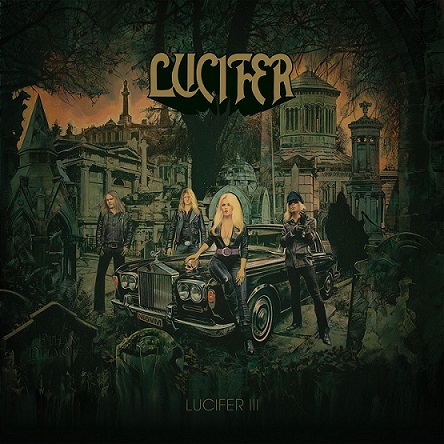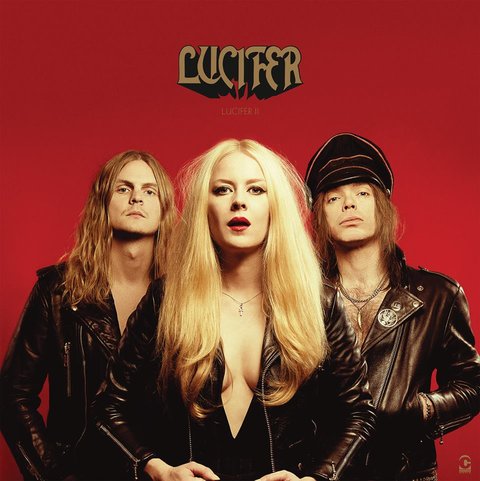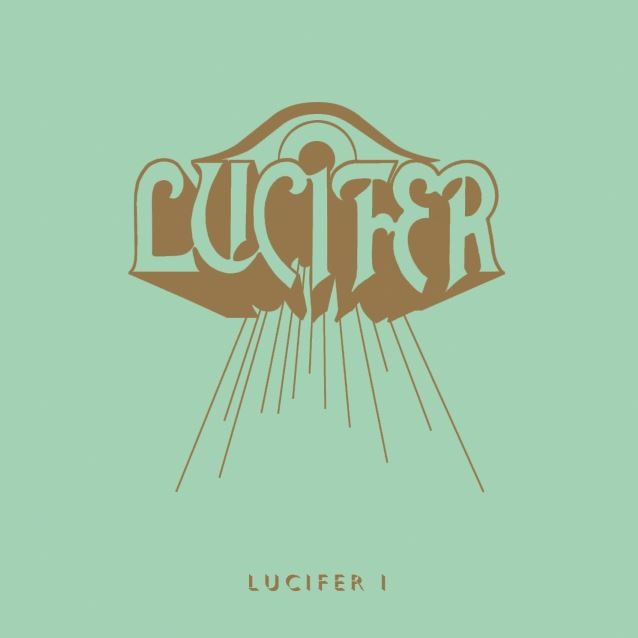Lucifer - Interview
Want to watch Lucifer's show for free with two friends and still socialize with the band backstage? It's simple: just bring a coffin to the show venue, and your entrance will be guaranteed, as revealed by vocalist Johanna Sadonis in the following interview. The band, completed by Martin Nordin (guitar), Linus Björklund (guitar), Harald Göthblad (bass), and Nicke Andersson, leader of The Hellacopters and Johanna's husband, acting as a drummer, returns to Brazil for shows in Rio de Janeiro (10/05), São Paulo (10/06) and Belo Horizonte (10/08). The tour promotes "Lucifer V", the fifth studio album, released in January and already mentioned by Johanna as her favorite in the discography. The conversation, however, goes beyond these topics, including reflections on musical influences, examples, and legacy.
Marcelo Vieira

How do you feel about returning to Brazil with the "Satanic Panic Tour"?
Well, I'm very excited. Can't wait to get away from Swedish coldness because now the summer is over. So for the past two days, it's been kind of like starting to get freezing. So I'm like, fuck yeah, let's get back to Brazil.
What are your expectations for the shows?
It's funny because journalists always ask me that and I never know what to say. And I talked to Nika about this. I'm like, what do you answer to that? So what are your expectations? I'm going to throw the question right back to you.
Well, I'm expecting a full-energy concert. We're mixing songs from the five albums. Maybe a little surprise here and there.
Okay. Lucifer will make sure to deliver. [Risos.]
What was your experience playing in Brazil for the first time? What memories stand out from that experience?
Yes. Well, we had a great time because we had some extra days in Brazil. So not only did we play to a really fun crowd because people in Latin America are a lot more outgoing and passionate when they go to shows. So it's more fun as a band to play because you actually communicate with your feelings. When you play in Germany or in Holland or something, people can be very stiff and reserved and they don't show so much. Sometimes you have an audience that's like this and it sucks when you're the band. So it's nice to have people who are like, yeah, fuck yeah. So that was one nice experience. The other one was when I was sitting on the beach drinking out of a coconut. That was awesome. And I want to repeat that.
What is your routine like during a tour? What do you enjoy doing in the cities you visit when you're not on stage?
I usually try to see a cemetery, like maybe some nice church or something. I try to eat local food like I try to find out what's a good place to eat. That's very traditional. I do want to see something that's, you know, that's like an important site or something culturally interesting. So I get to take home a memory, you know, of, yeah, like a cool place. I love old buildings and structures. But sometimes, you know, it kind of sucks when you don't have time to do that. When you have like a short schedule, like, for example, in the beginning of the Latin America tour, you know, we go to Buenos Aires. And then after the show, we sleep for three hours. We get up at four in the morning. We fly to Chile. Then we do the same thing. And then you can't see anything. And that kind of sucks. You kind of look out of the airplane window and it's like, oh, beautiful mountains. You know, then you take the taxi from the airport to the hotel. And so you don't see so much, you know, usually, you go out for dinner or you have lunch in the day or something. If you're lucky, then the venue is close to something cool. So you can walk around a little bit. That's why I love it when we have some off days. And I think we have some off days in Brazil this time again.
The latest Lucifer album was released in January this year. How do you assess the sonic evolution of Lucifer from the band's early days to "Lucifer V"? What elements do you think have remained consistent, and which have evolved?
Well, the first album was way more doom. It was a straight-on doom album with a little bit of 70 psychedelic influences. But I would say it was like 80 percent doom metal. Then changed band members and Nick came into the band and we started writing. It became a lot more. Doom started to shrink as a part. It's still there, but not as much as the other stuff that is more like 70s heavy rock stuff. You have some heavy metal influences. You have some soul even in there. Proto metal stuff. It's very it's a lot of different stuff that we listen to that kind of flows into the music. And. I don't think Lucifer changed crazy much, but it's really funny. Like I saw the other day on YouTube, there was a video where somebody was rating our albums. And then I looked at the comments and it was kind of funny because everybody had a different opinion. Somebody said, no, this album is more doom, but this album is more 70s. But then another person said the exact opposite. And one person said this album is a lot more dark than that one. And then another person thought, no, that one is more pop, and that one is more dark. So super confusing. And I think it's because we didn't change a lot, but we always have these ingredients. Like it's a little bit you have a pop element with the songwriting, but it is metal. It is doom. It is 70s rock. It's all these elements. But in different proportions, they move around. I would say, though, that the last album Lucifer 5 is in my eyes, probably if somebody said, which album shall I start with? I'd say, yes, start with Lucifer 5. It's my favorite album of all stuff.
Recurring themes in Lucifer's lyrics, such as occultism and spirituality, continue to be present in "Lucifer V". Are there any other specific themes that you explored more deeply in this album?
I would say in general, all the lyrics are really coming from the heart. So they're like really sincere. It's a lot of personal stories. So, you know, it could be that I had a horrible relationship with somebody, an ex-boyfriend, a really good friend of mine. All this will go into the songs always in Lucifer. But maybe on the last album, because I feel that it goes a little bit deeper into my heart somehow. Maybe it's because when you learn to write songs, maybe you get, hopefully, you get a little bit better every time. It's like, you know, you build a chair with wood and hopefully when you do the fifth chair, you kind of, you know, it's like better than the first one that you tried. And so it is with songwriting, I think, I hope. So maybe one just learns to express yourself better, you know. And maybe it's also when you get older that maybe you don't give a fuck so much anymore what other people think if you let out all these emotions. I think maybe it gets easier to suffer publicly.
My favorite moment on the album happens to be the single 'Maculate Heart.' What's the story behind this song?
That is really funny because in Lucifer I have written all the lyrics except for Maculate Heart. That's the only lyric another person has written and that was Nicke. And I have written the title because he wanted to name the song Bring It On. And I'm like, no, that's too simple. It's not morbid enough. I'm going to call it Maculate Heart because it's a word game because it's the immaculate heart. Right. So, of course, Lucifer being a cheeky motherfucker, I had to twist that around. But, yeah, I think Nicke wrote that lyric about, yeah, kind of like, you know, defiant, like a rebel. Like, come on, you know, if you want to fuck with me, bring it on. You know, this bullshit at me. And sometimes, you know, life throws you like obstacles and all kinds of horrible things. And sometimes it feels like really difficult because everything has like obstacles and stuff. I think that's what he meant.
You've mentioned the importance of analog recording for capturing the "life" of the music. How does this choice align with your overall vision for the band's sound?
Well, I think what it is, is we are not a fan of super modernized production. Because a lot of people, you know, a lot of rock and metal bands nowadays use computers to do a lot of work for them. Or to make the production sound very streamlined and very plastic and very like perfect. But I'm a music fan. And what I want to get out of music is I want to feel that that person who sings that song and who plays that guitar has been really going through it. You know, and they feel what they sing about and what they play about. And I think you hear that better in an old-school production because you sometimes hear little flaws and little noises. And it just sounds more organic and more human. And that's why, you know, all this like new AI bullshit. I mean, I see that obviously AI is practical for other work fields. But I think for creative things, you can't reproduce human emotions. That computer will have never suffered through that heartache or that death of somebody, you know. And like if you're a music fan, I mean, isn't it great if you hear a song and you kind of almost think, oh, wow, the song fits exactly to what I'm going through right now. But if an AI program has spit that song out, then you don't feel connected to that, you know, because it's not real. So I think, you know, that translates to that kind of live recording in the studio because, yeah, it's organic.
How do you ensure that the band's visual presentation complements and enhances the live musical experience?
I don't know if it enhances or if it makes it worse. [Risos.]
Are there any specific visual elements or concepts that you find particularly powerful?
Yeah, I mean, on the last tour in Europe, we had I bought a coffin, a real one, I bought it for myself. It's great because now Nico doesn't have to buy one when I die. Well, you never know, you know, like being in an airplane crash or something. Oh, shit. I shouldn't say that. OK, but it's actually cool with a coffin on stage because I'm somebody I'm kind of insecure. I don't I know it doesn't look like it, but I am actually a shy person. And when you only have a microphone and you don't have a guitar to hide behind, you sometimes feel a little bit. Insecure, I mean, I bet if I would I don't know, are you in a band or something?
I used to play the guitar in a band.
Ok, but if I only give you a microphone and then you're all of a sudden in the middle of a stage with the fucking microphone and you have to entertain everybody, it can be not so nice. So the coffin, I realize is great because I get to because a lot of songs are about people. So I get to play with a coffin like I can be like sing to the coffin. I can sit down on the coffin. I can cry in the coffin. I can, you know, have a glass of wine and cheer. It's like it gives me something to play with. So I actually love that. And people are always a little bit like because I usually put it in front of the stage in front of me. So people like want to touch it and stuff, you know, I think. And everybody can relate to what it symbolizes, you know. So I'm a little bit sad that when we come to Brazil now I won't have a coffin. So shout out to all you morbid coffin owners. If you bring a coffin to the show, I put you plus two friends on the guest list. You can get so much and you can hang out with me if you want to.
You've often talked about your major musical influences, but which more obscure, lesser-known bands inspired you in creating Lucifer's sound?
Lesser known. I mean. It's so many different things that we love, you know, it's like I mean, first of all, we all kind of grew up in the 90s with extreme music. Extreme metal like death metal and black metal and doom and all that stuff. And then I was a huge dancing fan when I was a teenager and I still am. But then there were also other things that I loved. Like, do you know Dead Can Dance? It's like it's like kind of from the 80s and 90s and it's kind of like spiritual. It almost sounds OK if I hate the word world music because I think it sounds like some sort of occult music. They made their own language when they sang and it sounds so dark sometimes. There's like some things, you know, or there was a Greek band called Aphrodite's Child that I thought was really cool. There's like different things. It could even be like a movie soundtrack, you know, and then it can be something that everybody knows, you know. And for me, even I love Type O Negative, you know when I was a teenager. And yeah, but underground stuff, I mean. Since it comes from so many different corners, there are obscure rock bands, you know, like Blood Rock. From the 70s or. Yeah, where to start? It's a million bands.
What are the biggest challenges and greatest pleasures of being the frontwoman of a heavy metal band?
OK, it's sometimes difficult to be a woman in a band because sometimes you get treated differently and that can be a good thing. You can take advantage of it or it can be a bad thing. So, yeah, I would say the worst thing is when you get not treated equally to guys when you get treated in a way where people maybe think. Ah, because she's a chick in the band, that means her husband probably does everything in the music. You know, when you when they don't take you seriously, they kind of assume that because I'm a woman and I have blonde hair or whatever, that I'm like a bimbo or something. And that is annoying. That's the worst part. Good part. Is there a good part? I don't know. Oh, yeah. Another annoying part is that as a woman, I always, of course, for the shows put on makeup and stuff. And it's sometimes annoying, like that the guys, they don't have to do that. They just like they just comb their hair and that's it.
Do you consider yourself a role model for other women who want to pursue a career in music?
I never thought about myself being a role model because I always felt like I was nobody, you know. But I know that I look up to other women who came before me that are women in music. You know, I'm a big fan of like I love the Runaways, Patti Smith, Blondie, you know, like there's so many girl schools. There are so many cool bands with girls in them. L7, The Donnas and stuff. I love all these bands. I'm just a music fan. So I never thought about myself being a role model. Like I said, I'm nobody. But if anybody if it motivates another girl that is like getting into rock and stuff. And if it motivates another girl to think, oh, she's doing that, then maybe I can also do that. Then that's really cool.
What album changed your life?
Danzig 3, How the Gods Kill.
What is your favorite song of all time?
Favorite song of all time? Yeah, many, many. But okay, here's one of the many favorite songs that I have. Whiter Shade of Pale, Rokoharum. Because it's it sounds very nice. But if you understand the lyrics, it's very, very morbid. And so that kind of captures some sort of morbid beauty that I am very interested in.
How would you like Lucifer to be remembered in the history of rock?
Well, if like two people remember Lucifer, then that's awesome.
What legacy do you, Johanna, hope to leave with your music?
Wow, these are all questions I never thought about. Because I, like I said, I really always feel like I'm like, you know, like you, I'm like a music fan. That's it. I have no idea what to say to that. Hopefully, we didn't make the albums all in vain. You know, I hope that maybe. Like I said, I hope that two people will still listen.
Discography
Upcoming Releases
- Morrath - Obscure Abominations - Feb 25
- Chalice - Divine Spear - Feb 27
- Blackwater Drowning - Obscure Sorrows - Feb 27
- Vide - Aux Enfants Des Ruines - Feb 27
- The Leaving - The Leaving - Mar 06
- Serpent Icon - Tombstone Stories - Mar 06
- Insect Inside - Reborn In Blight - Mar 06
- Triumpher - Piercing The Heart Of The World - Mar 06
- Lömsk - Act II - Of Iron And Blood - Mar 06
- God Against Humanity - The Judgement - Mar 06
- Miserere Luminis - Sidera - Mar 06
- Gravemass - This Is The Way - Mar 06
- No/Más - No Peace - Mar 13
- Monstrosity - Screams From Beneath The Surface - Mar 13
- Against I - Anti Life - Mar 13
- Empire Of Disease - While Everything Collapses - Mar 19
- Hanging Garden - Isle Of Bliss - Mar 20
- Putred - Blestemul Din Adânc - Mar 20
- Gaerea - Loss - Mar 20
- Diatribes - Degenerate - Mar 20

